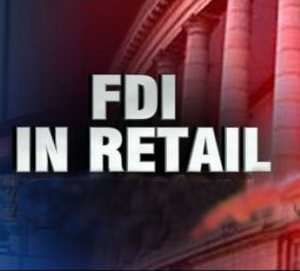
STRONG GROWTH IN INDIAN RETAIL INDUSTRY
The Indian retail industry has emerged as one of the most dynamic and fast-paced industries due to the entry of several new players. It accounts for over 10 per cent of the country’s Gross Domestic Product (GDP) and around 8 per cent of the employment. India is the world’s fifth-largest global destination in the retail space.
Market Size
India’s retail market is expected to nearly double to US$ 1 trillion by 2020 from US$ 600 billion in 2015#, driven by income growth, urbanisation and attitudinal shifts.
Online retail is expected to be at par with the physical stores in the next five years.

India is expected to become the world’s fastest growing e-commerce market, driven by robust investment in the sector and rapid increase in the number of internet users. Various agencies have high expectations about growth of Indian e-commerce markets. Indian e-commerce sales are expected to reach US$ 120 billion! by 2020 from US$ 30 billion in FY2016. Further, India’s e-commerce market is expected to reach US$ 220 billion in terms of gross merchandise value (GMV) and 530 million shoppers by 2025, led by faster speeds on reliable telecom networks, faster adoption of online services and better variety as well as convenience
Investment Scenario
The Indian retail trading has received Foreign Direct Investment (FDI) equity inflows totaling US$ 537.61 million during April 2000–March 2016, according to the Department of Industrial Policies and Promotion (DIPP).

With the rising need for consumer goods in different sectors including consumer electronics and home appliances, many companies have invested in the Indian retail space in the past few months.
- International Finance Corporation (IFC), the investment arm of The World Bank, plans to invest up to Rs 134 crore (US$ 19.86 million) in Kishore Biyani’s Future Consumer Enterprises Ltd, which is expected to aid the company in driving its growth plans.
- Amazon India has opened six new fulfillment centres across Chennai, Coimbatore, Delhi, Jaipur and Mumbai, which will open up 5.5 million square feet of storage space for sellers on the marketplace who use the ‘Fulfilled by Amazon’ service.
- IKEA, the world’s largest furniture retailer, plans to invest Rs 10,500 crore (US$ 1.56 billion) to set up 25 stores across India and hire over 15,000 permanent employees and 37,500 temporary employees to assist in running its stores.
- Amazon Inc. has announced that the company would invest an additional US$ 3 billion in India operations, thereby taking its committed investment in the country to over US$ 5 billion.
- Aditya Birla Fashion and Retail Limited (ABFRL) has announced that it will acquire exclusive online and offline rights of Forever 21, an American fast fashion brand, in the Indian market.
- Massimo Dutti, a premium fashion brand from Spain offering sophisticated womenswear, menswear, footwear and accessories, has entered India by opening its first store at the Select Citywalk mall in New Delhi.
- Lenskart, India’s largest online eyewear retailer, has raised Rs 400 crore (US$ 59.3 million) in series D round of funding led by World Bank’s investment arm International Finance Corporation (IFC), which will be used to enhance its technology, supply chain, lens manufacturing, and expand the reach of its high-quality eyewear products across Tier-3 and Tier-4 cities of India.
- Neil Barrett, one of the leading Italian fashion brands, has forayed into the Indian market by establishing its retail presence through an exclusive partnership with Fervour, a multi-brand boutique that stocks international designer brands.
- New York-based designer brand Kate Spade will be launched in India later this year and will set up a network of stand-alone stores across major cities, thus becoming one more global brand entering the Indian retail space after the Government of India relaxed single brand retail norms recently.
- KartRocket, a Delhi based e-commerce enabler has completed its US$ 8 million funding round by raising US$ 2 million from a Japanese investor, which will be used to enhance Kraftly, a mobile-first online-to-offline marketplace targeting small sellers, individuals and home-based entrepreneurs in India in product categories such as apparel and accessories.
- PurpleTalkInc, a US based mobile solutions company, has invested US$ 1 million in Nukkad Shops, a Hyderabad based uber-local commerce platform that helps neighbourhood retail stores take their businesses online through a mobile app.
- Mumbai-based baby care and kids products e-tailer, Hopscotch.in, has raised US$ 13 million in a Series C round of funding from Facebook co-founder Mr Eduardo Saverin, which will help the firm in growth and expansion of its technology platform.
- Gurgaon-based e-commerce firm Shopclues has raised US$ 150 million from Singapore government’s GIC and its existing investors Tiger Global and Nexus Venture Partners, at a valuation of US$ 1.1 billion, thereby becoming the latest among several e-commerce companies from India reaching a billion dollar valuation.
- Amazon India expanded its logistics footprint three times to more than 2,100 cities and towns in 2015, as Amazon.com invested more than US$ 700 million in its India operations since July 2014.
- Adidas AG, reknowned for its Adidas and Reebok sports brands, has become the first foreign sports company to get government approval to open 100 per cent foreign-owned stores in India.
- Walmart India plans to add 50 more cash-and-carry stores in India over the next four to five years.
- Aeropostale, an American teen fashion retailer, has chosen to enter India over China, and expects India to be among its top three markets over the next four years with revenue target of Rs 500 crore (US$ 74.12 million).
- Opinio, a hyperlocal delivery start-up, has raised US$ 7 million in a Series-A funding from Gurgaon-based e-commerce fulfilment service firm Delhivery along with investment from Sands Capital and Accel Partners.
- Textile major Arvind Limited has announced a partnership with Sephora, owned by LVMH Moet Hennessy Louis Vuitton, a French luxury conglomerate, in order to enter into the beauty and cosmetics segment.
- Mobile wallet company MobiKwik has partnered with Jabong.com to provide mobile payment services to Jabong’s customers.
- DataWind partnered with HomeShop18 to expand its retail footprint in the country. Under the partnership, HomeShop18 and DataWind would jointly launch special sales programmes across broadcast, mobile and internet media to provide greater access to the latter’s tablet range.
- FashionAndYou has opened three distribution hubs in Surat, Mumbai and Bengaluru to accelerate deliveries.
- Abu Dhabi-based Lulu Group plans to invest Rs 2,500 crore (US$ 370.6 million) in a fruit and vegetable processing unit, an integrated meat processing unit, and a modern shopping mall in Hyderabad, Telangana.
- Aditya Birla Retail, a part of the US$ 40 billion Aditya Birla Group and the fourth-largest supermarket retailer in the country, acquired Total hypermarkets owned by Jubilant Retail.
- With an aim to strengthen its advertising segment, Flipkart acquired mobile ad network AdiQuity, which has a history of mobile innovations and valuable experience in the ad space.
- US-based Pizza chain Sbarro plans an almost threefold increase in its store count from the current 17 to 50 over the next two years through multiple business models.
The Road Ahead
E-commerce is expanding steadily in the country. Customers have the ever increasing choice of products at the lowest rates. E-commerce is probably creating the biggest revolution in the retail industry, and this trend would continue in the years to come. Retailers should leverage the digital retail channels (e-commerce), which would enable them to spend less money on real estate while reaching out to more customers in tier-2 and tier-3 cities.
Both organised and unorganised retail companies have to work together to ensure better prospects for the overall retail industry, while generating new benefits for their customers.
Nevertheless, the long-term outlook for the industry is positive, supported by rising incomes, favourable demographics, entry of foreign players, and increasing urbanisation.
Growth in retail space only means more retail jobs to provide employment to more people! – Definitely a good reason to celebrate!!..:)
Reference- IBEF
